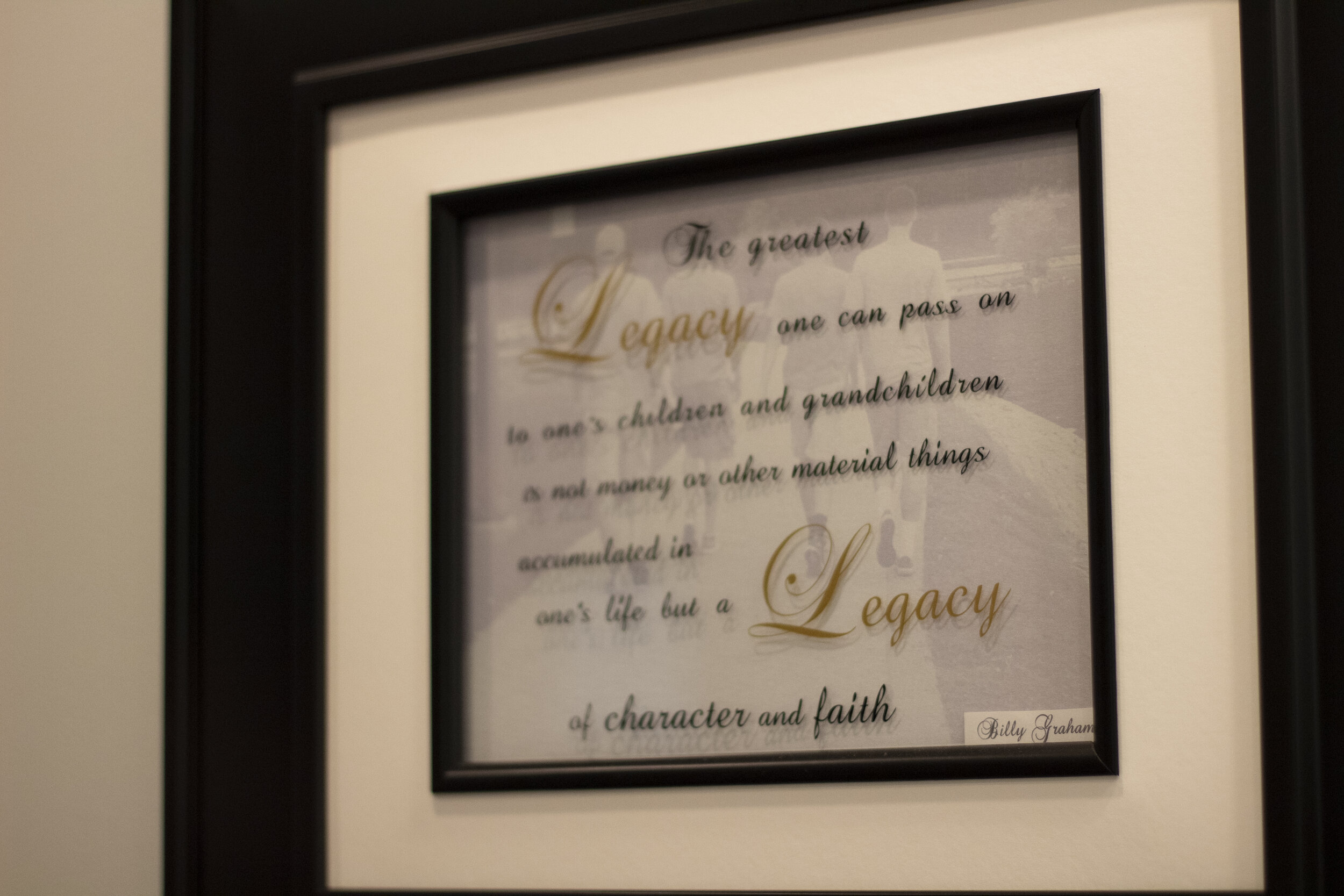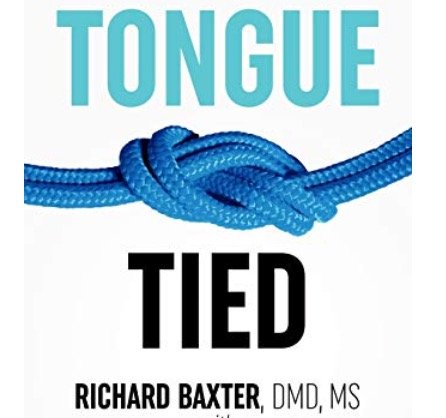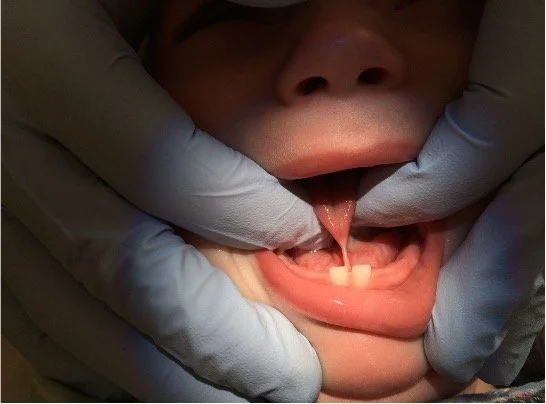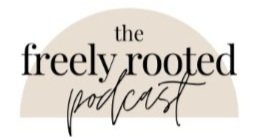
Blog
We are constantly learning so that, with wisdom and good stewardship, we can utilize the best research-backed techniques, materials, and treatments. We believe that excellence matters in all aspects of our care, and it shows.
Tongue and Lip Ties Part 2: Gathering Information and Consultations
We read books, researched online, listened to podcasts, and had consultations with 5 professional healthcare providers before making our decision about our son’s lip and tongue tie. Here’s what we learned!
As parents our emotional journey leading up to my son's release procedure was a rollercoaster of anxiety, uncertainty, and determination. We were somewhat anxious through the entire process but our unwavering commitment to our son's well-being ultimately led to the decision to proceed with getting his ties released. Along the way, we researched on our own and consulted with various healthcare professionals to ensure we would make the best choice for our child.
Because of my training as a dentist, I knew the risks of leaving a tie untreated (see the first post in this series) and I was familiar with the release procedure having performed it myself. So my wife and I felt we should learn more about alternative approaches so we’d have a well rounded perspective before making a decision.
Outside of professional guidance, some of the resources we used were:
Dr Ghaheri’s blog and website: Excellent all around resource. Dr Ghaheri is an ENT but offers a balanced perspective and respects the role of other providers in treating possible tongue and lip tie
Tongue Tied book by Dr Richard Baxter: Lots of great information from a pediatric dentist and a team of other providers who treat tongue tie routinely.
Freely Rooted podcast: The Big Picture of Tongue Ties: A podcast episode with a conservative perspective on why not every frenum is a “tongue tie”, and emphasizes a holistic approach
The specialists we consulted with were a lactation consultant, a chiropractor, a myofunctional therapist, a pediatrician, and finally the surgeon who ended up doing the release procedure. Below I’ll describe our experience with each.
Lactation Consultant Consult:
This is the first place anyone with questions about breastfeeding issues should start. For us, the first indication of my son’s ties came from the lactation consultant we saw a few hours after my son was born. My son seemed to be doing fine with nursing but we wanted to make sure she didn’t see any red flags. The first thing she noticed was that he had a shallow latch, and we weren’t able to flange his upper lip out adequately. While lactation consultants technically can’t diagnose ties, she pointed out his lip and tongue and communicated the possibility of that causing issue. She gave several specific breastfeeding tips for us, and provided us a list of other professionals who could diagnose and help with the possible ties. Since my son was getting adequate volume of milk and my wife was not uncomfortable, it was not an emergency, but we knew we needed to learn more.
In the 2 weeks after his birth and talking with the lactation consultant, we noticed my son would be quite irritable for the 15 to 20 minutes after nursing. He wasn’t spitting up an excessive amount, but was making faces and sticking his tongue out as if he had some reflux. He also seemed a little more gassy than our first child. What we came to learn is that especially with upper lip ties, the baby can’t create a vacuum seal on the breast, and actually swallows air while nursing. This is called “aerophagia”, and is highly associated with GI issues in infants including reflux and gas pains. Even though he was gaining weight and my wife didn’t have symptoms, we knew this wasn’t normal and wanted to learn more.
A blister is indicative of a poor latch
An indicator of upper lip tie may be a blister on the infant’s lip. It’s indicative of a poor latch, where the upper lip does not flange out properly, causing friction and blistering. Here you can see the blister and tie. Image courtesy of Dr Ghaheri. He’s a great resource.
Pediatrician consult
Our pediatrician also gave us valuable information. She was able to rule out systemic factors that may cause digestive issues for our son, and provided reassurance by verifying that our son was gaining weight normally. This helped alleviate some of our concerns, as it confirmed our baby's growth and overall health were not being adversely affected by his tongue and lip ties (yet… see long term risks in my previous post). Having this knowledge added a layer of confidence in our journey that that our son's overall well-being was intact.
Chiropractor Consult:
When a tongue or lip tie is present, alternative strategies to address it involve making sure the surrounding tissue and fascia are not too tight. Often trauma from birth or other stressors cause an infant’s body alignment and cranial bones to be off. Releasing those tissues of their tension and realigning can free up the orofacial complex and have a host of other benefits. Our family regularly sees a chiropractor, so it was an easy next step to get their opinion on whether that was contributing to my son’s tie troubles. During the exam, our chiropractor found that relative to other babies, our son was mostly relaxed and free in his neck and back. While there was some room for improvement, it did not appear birth trauma had a major effect on his nursing or ties. This was enlightening, but we still wanted to learn more.
Myofunctional Therapist Consult:
Initially, we wanted to have a consult with the surgeon who would possibly do my son’s release, and their office recommended we see a myofunctional therapist first. This particular therapist specializes in orofacial musculature and function, and is also a board certified lactation consultant. In her exam she was able to reaffirm what the chiropractor told us, and also noted the relative severity of my son’s ties. She gave us some specific exercises to help, but said that while for many children myofunctional therapy alone can solve breastfeeding issues, it would likely be insufficient given the severity of our son’s ties. She was willing to work with us if we didn’t want to get the ties released, her opinion was clear.
After our visit with the therapist, our parental anxiety increased somewhat. A part of us wanted a good reason to avoid the releases if possible. It was just hard to imagine the discomfort our little guy would have during and after the procedure. At this point, we thought we knew the best choice. But we wanted to see what the surgeon had to say first.
Surgeon consult:
The surgeon we saw came highly recommended from my dental colleagues and lactation consultants alike. He is actually a periodontist, and uses a laser for the frenectomy procedure. It’s outside the scope of this blog to compare laser to scissors for the releases, but since I am a dentist and have done this procedure with a laser before, the laser was more comfortable for us as parents. This is generally what I recommend for my patients as well.
In our consult with the surgeon, he recommended releases. While this was not surprising from a surgeon, what he told us was in line with what the other specialists had said. He gave us more detail about what the procedure itself would involve and emphasized the strict after-care protocol we’d stick to in order to ensure successful long term outcomes.
In the end, we knew what we had to do.
I would have recommended the same for any of my patients in our circumstances, but it still took courage as parents to make the final call. We prayed for wisdom and discussed among ourselves. In the end, we scheduled the releases.
By the way… Should you try bottle feeding?
Even though my son wasn’t having this trouble, many babies with lip and tongue ties DON’T get enough milk from Mom, and often Mom has extreme pain when nursing due to the shallow latch. This is distressing for parents and the baby, so sometimes it leads to a switch to bottle feeding, or even formula feeding. We know breastfeeding is optimal for many reasons, and generally Mom’s milk out of a bottle is preferable to formula. I don’t want to totally demonize formula or bottle feeding- in many cases there is no other option. There’s always a risk/benefit analysis to be done. Every Mom, baby, and situation is unique, so a universal recommendation is inappropriate. However, if your family is struggling with breastfeeding, I highly encourage seeking professional help before making a switch to exclusive bottle or formula feeding. At the end of this post are resources to learn more.
The Day of the Frenectomy Procedure:
As a dentist, I knew this procedure would be quick and simple. Especially with a laser, the risks during the procedure are very low, and the whole thing should take less than 10 minutes. Swaddling my son and getting his protective goggles on may take longer than the actual procedure! As a Dad though, I had a mix of emotions. Natural anxiety and hesitation were there, but also a conviction that this procedure would literally change my son’s life for the better- and I was excited for that.
The 10-minutes my son was away from us didn’t actually feel that long. Afterward when we held our son again, a wave of relief washed over us. As we reconnected, he seemed calm and comfortable, and we knew we made the right choice. We were so thankful! Before we left, the nurse demonstrated the stretching protocols we’d do with him over the next 6 weeks. We will talk more about that in our third post in this series.
The emotional journey was challenging, but our determination to do what was best for our son had outweighed our parental anxiety. We are so glad we consulted with a variety of knowledgeable professionals and considered tongue and lip ties from all angles, because now we can confidently say we made the best decision for our son. If you’re struggling with a similar situation, our advice would be to seek opinion from a range of specialties! The best choice for your little one may be different than ours.
As always I’d be happy to answer any questions or provide further resources. Thanks for reading.
Dr Brayden Teuscher
Additional References:
Smith, A. B., & Johnson, C. D. "Tongue and Lip Ties: A Comprehensive Guide for Parents." Journal of Pediatric Health
Taylor, E. L., & Brown, S. M. "Myofunctional Therapy and Its Role in Infant Health." Pediatric Dentistry Today
Walker, L. M., & Davis, J. R. "Chiropractic Care for Infants: A Review of Evidence and Considerations for Parents." Journal of Pediatric Care
Smith, J. R., & Johnson, L. K. "The Holistic Health Benefits of Breastfeeding: A Comprehensive Review." Journal of Pediatric Health and Nutrition
Brown, A., & Harries, V.. "Benefits of Breastfeeding: A Holistic Approach to Infant Health." Pediatric Nursing
COVID-19 Update
The NEWS is continuously changing, particularly with regard to COVID-19 / “Coronavirus”. We are serious about safety and health. Here are the precautions we have in place to help keep our staff and you safe from COVID. Please know that Teuscher Legacy Dental is…
The NEWS is continuously changing, particularly with regard to COVID-19 / “Coronavirus.” We are serious about safety and health. Here are the precautions we have in place to help keep our staff and you safe from COVID. Please know that Teuscher Legacy Dental is always monitoring the most up-to-date news, alerts, and safety precautions. What will NOT change is our ongoing commitment to YOU. The needs of our patients are our #1 priority, including your interests, comfort and safety. We are now open for all dental procedures. If you have any questions, you can always give us a call or text.
Summer 2022 update:
As a part of our move to our new office, we have made several technological updates to keep you as safe as possible! One of the most important is our state of the art air filtration system. When we designed our new office, we were able to leverage the latest thinking in infection control coming out of the COVID years. Our air filtration is as safe as it gets!
This spring we had an OSHA consultant review our infection control procedures and affirm our processes.
In addition to the latest sanitation technology, products and procedures, our new office has private operatories. This means enhanced privacy for you, but importantly, also means any aerosol we generate in one room will not travel to adjacent rooms. Put simply, other people’s germs will stay in their own rooms so you won’t have to wonder about cross-contamination.
Per CDC and IDPH recommendations, we still ask that patients wear masks in our office. Please help us love and protect others by masking during your visit. Thank you!
March 16th, 2021:
Last week, we brought in a leading expert on infectious diseases and infection control
The expert checked out our facilities and talked in depth with our staff. Not only were we reassured that our sterilization and sanitation measures are the best in the business, but we were also told that the products we use – which effectively kill concerns such as HIV and Hepatitis – also kill the relatively weaker Coronavirus COVID-19.
May 12th, 2020:
The Illinois Department of Public Health has advised that Illinois Dental practices are fully open for all procedures.
We are now open!
Your well-being is always our top priority. We are committed to be the safest possible office and environment for both our patients and team. For more information, check out our dedicated COVID-19 Update page.
May 4th:
In following Illinois’s “Shelter in Place” modified extension, we are planning to officially reopen our office on June 1st.
Our team is working hard during this time to learn and plan for a safe and successful return. We are getting everything ready: PPE protocols, pre-appointment coronavirus screenings, staggered scheduling to reduce the number of people in the office at a given time, antibiotic mouth washes, and innovative suction systems to eliminate aerosols, just to name a few. We will be posting more updates soon about how we’ll be back ready to serve you better than before!
Our team will always try to accommodate patients with emergencies and other time-sensitive needs. We are monitoring our phones every day, so if you have any questions or concerns, give us a call!
As always, we are paying close attention to the guidance of the CDC, ADA, ISDS and Illinois government. We hope you and your family are well and look forward to seeing you soon!
March 26th:
We’re living in interesting times! To protect our patients and team and to honor our medical colleagues’ requests, we have suspended all routine dental care until April 8th. This is in line with Illinois’s “Shelter in Place” order, as well as guidelines from the ADA and ISDS. We are still seeing emergency patients.
To protect our patients and team, and to honor our medical colleagues’ requests, we have suspended all routine dental care until April 8th.
Remember: if you are experiencing pain, swelling, or have another urgent need, we will still take care of you. If you have any questions or concerns, please give us a call or text. We are monitoring our phones daily.
In the meantime, our team is using this as an opportunity to learn new skills and improve our current systems. We’ve also been able to enjoy a little more downtime to relax with some of our favorite hobbies. To see some of what we’ve been up to, check out our Facebook page.
Be safe, be healthy, be Blessed!
March 23rd:
To protect our patients and team, and to honor our medical colleagues’ requests, we have suspended all routine dental care at this time.
This is in line with the ADA, ISDS, and other health organizations, in addition to the recent “Shelter in Place” protocol. We will keep you informed, but in the meantime, we will offer care on an emergency basis only. The ADA defines a dental emergency in great detail, but if you are experiencing pain, swelling, or have another urgent need, we will be sure to take care of you.
If you or your family have any questions or concerns, please call us, as we continue to monitor our phones. From all of us at Teuscher Dental, be safe and be healthy!
March 18th:
We are making decisions on a daily basis based on the best information we can receive from credible sources in dentistry and medicine, along with the CDC and WHO. The health of the people who trust us for their and their families’ care, and the health of our team and their families is TOO important to take risks with non-essential procedures.
Be sure to contact us for emergency situations and for any questions that anybody might have. Elective dental procedures, including most hygiene procedures, are postponed until next Monday and will be rescheduled. Again, if you are experiencing pain or have any questions, please call us. We appreciate your understanding and willingness to make this sacrifice with us as we all do everything that we can to ensure public well-being.
What we are doing in light of recent news:
We have always been dedicated to exceeding even the most stringent OSHA protocols for maintaining a sterile environment.
For patients who have appointments, we are screening for illness risk factors such as recent travel to foreign countries and any current or recent symptoms.
We are choosing to remove from our reception areas items that are frequently touched, such as magazines, pens and our coffee machine.
In addition to our sterilization procedures in each operatory before and after every patient, we are also committed to disinfecting our reception and restroom areas twice an hour – including all door handles, faucet handles and light switches.
What you can do while you are here:
Please sanitize your hands when you arrive, using hand sanitizer dispensers we have provided for you.
We also request that you use the provided hand sanitizer dispenser as you check out at our front desk.
What we can ALL do:
Wash our hands frequently. Soap and water is best.
We’ve probably all heard not to touch our faces, including eyes, nose and mouth. But if we MUST touch our face, it is best to wash or sanitize our hands both before AND afterward.
Resist touching our faces with (or chewing on) pens, pencils, fingernails.
Cover a sneeze or cough with our inner elbow (if possible) or a tissue.
Avoid touching often-touched items, and wash hands after touching these things, also sanitize these things at home if possible: door knobs, faucet handles, toilet handles, light switches, remote controls, refrigerator and other appliance handles, buttons like on elevators and cash machines or check-out registers, even your cell phone, computer and your vehicle’s steering wheel.
Avoid shaking hands or having close contact with others who are sick.
Stay home and away from others if we feel sick, and call a physician for advice.
Get plenty of rest, eat properly, drink plenty of fluids, do our best to stay healthy.
AND, PLEASE, LET’S ALL:
Remember that we can always safely “touch” others with a smile, a kind encouragement, an act of kindness, prayer and compassionate humanity.
Stay calm and use wisdom rather than give in to irrational fear. What we are facing can be scary, for sure, but let’s face it with heart, community, sensitivity and grace.
Two Crucial Cold Weather Health Tips to Know Today!
Lots of sane people love winter weather, but I’m not one of them. Give me the hot sun any day. But everything in life gives us an opportunity to learn, and cold weather is no exception. Here are two cold weather essentials you should know: 1. Nose Breathing is best…
Lots of sane people love winter weather, but I’m not one of them. Give me the hot sun any day. But everything in life gives us an opportunity to learn, and cold weather is no exception.
Here are two cold weather essentials you should know:
1. Nose Breathing is best in cold weather – and the rest of the time too.
Studies show that breathing through your nose (as opposed to breathing through your mouth) not only warms the cold winter air, and cleans and humidifies the air – all good for lung health, but nose-breathing may also improve your memory. Memories have 3 main stages of development: encoding, consolidation & retrieval, and according to a recently published Journal of Neuroscience study, nose breathing – but not mouth breathing – enhances all three of these memory stages. For the athlete in all of us, it’s interesting to note that the nasal-pulmonary reflex closes the lungs when the nose closes and opens the lungs when the nose is more open – the Cleveland Clinic says this may be why elite athletes like using nasal strips during exercise. Nose breathing also warms the air before reaching our delicate lungs, humidifies the air for our throat and lungs, and helps clean the air of bacteria, viruses, allergens, pollutants, dust and more before that air reaches your lungs.
2. Pay Attention to the Warning of Cold Sensitivity when it comes to your teeth.
This is no small thing. According to the ADA, causes of sensitive teeth include tooth decay, cracked teeth, worn tooth enamel, worn fillings, and tooth roots that are exposed because of periodontal (gum) disease, gum recession or even from too-aggressive tooth brushing. The Mayo Clinic says that periodontitis, a form of gum disease, can not only cause tooth loss but some research suggests that the bacteria responsible for periodontitis can enter the bloodstream through gum tissue, possibly affecting your heart, lungs, and other parts of the body. Periodontitis may be linked with respiratory disease, rheumatoid arthritis, coronary artery disease or stroke.
If your teeth are sensitive to cold air, it can be vitally important to heed this warning and take action now with your dentist because periodontal disease can be quite serious, and because other causes of cold sensitivity may be way easier to treat when caught early.
So let the cold weather be an opportunity to learn about your health, and a motivation to take positive action! As always, I’d be honored to help you in any way I can.
Your grateful partner in health,
Dr. Mike
Build Your Legacy
Although many people have heard of Weston Price, not everyone realizes he was a dentist. A man ahead of his time, Dr. Price was one of the first to suggest a relationship between nutrition, dental health, and physical health. He studied the nutrition and overall…
Although many people have heard of Weston Price, not everyone realizes he was a dentist. A man ahead of his time, Dr. Price was one of the first to suggest a relationship between nutrition, dental health, and physical health. He studied the nutrition and overall health of a wide range of cultures, taking particular note of the amount of processed foods and sugars consumed by these cultures. His research led him to conclude that the introduction of a “modern Western diet” was associated not only with a decline in the dental and overall health of the people who ate those foods, but in their offspring he also noticed a developmental decline in proper facial bone structure – resulting in overcrowding of teeth.
Taking care of our dental health today not only affects our overall health in ways we may not realize, but, according to Dr. Price’s research, our choices can also affect the overall health, future dental health – possibly including the need for orthodontics – of our children. We have the opportunity to leave a lasting legacy of health through the choices we make. Why not start building that legacy today?









